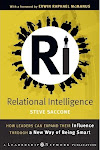Web browsing strengthens brain functions related to fast-paced problem-solving, particularly when it requires spotting patterns in a plethora of data. Studies show that internet users can assess the trustworthiness and probably value of a web page within a few seconds. The more we practice surfing and scanning, the more adept our brain becomes at those tasks. And even other academics say that web provides us with a valuable outlet for a growing "cognitive surplus."
On the other side of things, every medium develops some cognitive skills at the expense of others. Our growing use of the web and other screen based technologies has led to the widespread and sophisticated development of visual-spatial skills. But those gains go hand in hand with a weakening of our capacity for the kind of "deep processing" that underpins "mindful knowledge acquisition, inductive analysis, critical thinking, imagination, and reflection."
I believe all this has implications for how we view and handle relationships. How about you?
What do you think about this statement: "The internet is an interruption system. It seizes our attention only to scramble it."
Read more at wired magazine's article called "CHAOS THEORY"
Steve Saccone's Reflections on a New Way of Being Smart
Relational Intelligence
Create Movement. Remember to Love.

- Steve Saccone
- Los Angeles, CA, United States
- Steve is a leadership catalyst, writer, and creativity consultant. He works with Mosaic, a spiritual community in Los Angeles who strives to empower creativity of the human spirit, as well as cultivate relational and spiritual health. Steve also works as a Field Advisor for the Gallup Organization, serves as Director of Protege, a 2-year Global Leadership Program, and is an Adjunct Professor and guest lecturer for numerous universities.
Reading That's Worth Your Time
- A Whole New Mind: Why Right Brainers Will Rule the Future
- Drive: The Surprising Truth About What Motivates You
- How to Think Like Da Vinci: Seven Steps to Genius Everyday
- Lynchpin: Are You Indispensable?
- The Journey of Desire: Searching For The Life We've Only Dreamed Of
- Who's Your City? How the Creative Economy Is Making Where to Live the Most Important Decision
